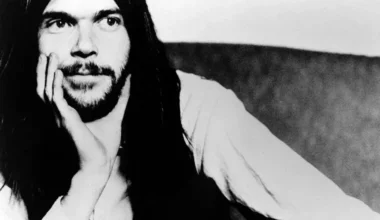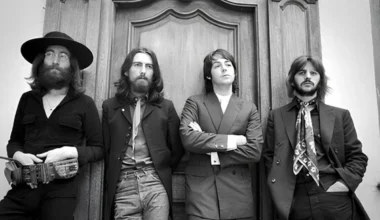There were two competing forces in Led Zeppelin. One was the blues’ simple twelve bars and three core chords, but the other came to the forefront when they comically won the greatest rock band of all time after Planet Rock held a survey asking their audience to vote for their favourite singer, guitarist, bassist, and drummer. The supergroup that this fantasy poll created already existed; their name was Led Zeppelin, and each member won their respective category.
In short, while their central tenets were based on simplicity, they were brimming with monumental musicianship that could elevate musical beans on toast to Michelin Star status. In this regard, ‘Black Dog’ is a simple track in the hands of another band, but Led Zeppelin created a time structure so complex that even Timpson’s could not help.
Nonetheless, they managed to get through ‘Black Dog’ on 230 electrifying live performances. After all, they were a performing band. Jorgen Angel, the photographer who captured their first performance, told us, “When they went on stage, it was something very special, different, and spectacular.” They were energetic and unique. They were also different when recorded. For some, the unnecessary musical flourishes they inserted into the blues were simply overblown. Others saw them as virtuosos who were pushing the boundaries of rock.
However, they hoisted themselves on their own petard due to one track. John Bonham may not be the greatest rock ‘n’ roll drummer of all time, but he’s certainly a contender. Modern masters, such as Matt Helders, continue to draw inspiration from him, as evidenced. He stated, “He’s somebody that I always come back to.”
Speaking of his ‘Moby Dick’ solo, he said, “It gives me chills, and that’s not an exaggeration.” I can barely express how it affects me. It’s absolutely perfect. It appears impossible to meet such a high standard. It’s not that difficult; many people could and probably have learned to play it. But the way that he executes it is just so unique – there’s so much character to it.”
Nonetheless, character couldn’t help Led Zeppelin drum their way out of a pickle with ‘Four Sticks,’ perhaps the most obscure song on the opus that is Led Zeppelin IV. The song’s meandering wistful section provides a contrast to the heavy yang of the majority of the track. After all, George Harrison himself had suggested that they offer a change of pace. To accomplish this, they took a literal approach, transitioning from the thunderous 5/4 main section to a dreamy 6/8 before returning to the insistent main riff without breaking stride.
Even recording this rhythmic oddity was difficult, let alone playing it live. “It took him ages to get ‘Four Sticks’,” John Paul Jones said of Bonham’s angry struggles. “I appeared to be the only person who could actually count things in. Page would play something, and [John] would say, ‘That’s awesome. Where is the first beat? You know it, but you have to tell us…’ He was unable to count what he was playing. It would be a fantastic phrase, but you couldn’t apply it to a count. If you think of ‘one’ as being in the wrong place, you are completely screwed.”
In other words, the band was singing from the same hymn sheet but in different languages. The meta was completely messed up, and the self-taught ‘Thunder of Drums’ was at a loss. Perhaps this wasn’t surprising, given Jimmy Page’s statement, “The song was supposed to be abstract.” As the band’s heartbeat, this made Bonham look at a Jackson Pollock and wonder which part was the nose. In the end, he got it in two takes, not because he nailed it, but because, as Page put it, “it was physically impossible for him to do another.”
Drinking a beer helped Bonham along the way, enabling him to lay down a beat with Dutch courage. He took inspiration from the Little Richard classic ‘Keep a Knockin’’, originally drummed by the legendary Charles Connor, who James Brown fitting declared “was the first drummer to put funk into rhythm”. As a result, the presence of a funk echo in the mix is indicative of Led Zeppelin’s wildly eclectic oeuvre.
In the end, Bonham refused to give up, returning for more after his first take went down. The clacking sound you hear on the track is Bonham running through it a second time with an extra stick in each hand. So, why it is called ‘Four Sticks’. What’s more, he even declared consummate victory over his foe by playing it live… once… in Copenhagen.








